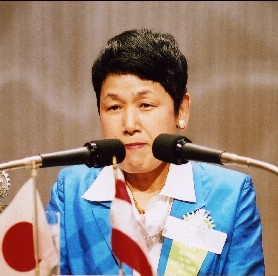The Female Condition in Japan and the United States
June 8th,2005
Vice Chancellor of the Showa Women��s University
Ms. Mariko Bando
 ��As a Fellow of the Kennedy Law School, I visited Harvard after a 25 lapse. Then it was the time of Japan as No.1, but today it had changed to Japan passing, Japan nothing, and I was quite sorry.��
��As a Fellow of the Kennedy Law School, I visited Harvard after a 25 lapse. Then it was the time of Japan as No.1, but today it had changed to Japan passing, Japan nothing, and I was quite sorry.��
T��herefore, I held a symposium named ��Women, NGO��s and POP culture��. The Americans are keen to know what has transpired in the past 25 years. I was encouraged to learn that they appreciated the fact that we had a free culture, that NGO��s and NPO��s were active in our society, with women free to exercise their talents. So I wish to explain the condition of women in Japan today.
��After the war, at first it said that the female vote, co-education, equality under the law, re-drawing of the family laws were presented to us by the GHQ. Although the rules had changed, female consciousness had not, and the woman still lived under the constraints of a large family.
��Women worked less hard during the high growth era, and the working female number fell to 45%. In the meantime, the female position had been greatly strengthened as in legacy laws.
��During the latter half if the 70��s, equal employment opportunity laws, baby care absence laws came into effect, strengthening female rights further.
��In America, equal employment laws had come into effect 20 years earlier, and in Europe the Scandinavian countries, France and Germany all had created laws which strengthened female social rights. However, American standards are not global standards.
��During the so-called 10 or 15 lost years in economic terms, female rights made great progress. The Men/Women Mutual Participation Social Basic Law was born in 1999, the NPO Law in 1997, the Caretaking Insurance Law in 2000, the law prohibiting engaging in prostitution by minors, the law prohibiting violence against spouses were all effect by social pressure, showing the advances our society has made.
��There was a time when government officials had a monopoly on information and drew up laws for the good of society, but in the past 10 to 15 years, we have been able to freely obtain new form abroad, and influence our nation��s Law making.
��Our female education today is second to one, and our female natural life span is the longest in the world and our good health is evident.
��In America, nothing is being done to support working females, or to help those with offspring. There is no systemized vacation for women with children, and I wondered about women��s advance in society without such protection. Their birth rate is 2.1.
��One factor, is that should grievances arise, the resort to law suits. Such law suits can cause much damage to the firm involved. Another factor is the high percentage of divorces. America is diverse and there is discrimination. As the market is diverse, so must the company if it is to meet the needs of the market.
��According to the Seasonal Journal of listed firms, there are 2,783 such in Japan today.
��The total of female board members in these firms is 246, or 0.7%, in contrast the number of such in Fortune��s 500 is 779 or 13.6%. Of the Japanese 0.7, one third are outside directors, and another third are family members. Only a third of have risen through the ranks.
��There is a difference too, among middle management. In America, female middle management comprises 46.5 to 50%, while it was in Japan��s last year��s figures, 9.7%. For labor in general 47% were females, and 53% males. In Japan, it is 40% female and 60% male.
��In Japan, during the child bearing years of 30 to 34 many females leave their jobs, returning in their 40��s.
��Our birth rate is depressed at 1.29. In order to remedy this, a Next Generation Cultivation Promotion Law is being made. In America, the gap between the rich and poor is widening. In Japan, we are aiming for everybody working and all becoming wealthier but who knows what the future holds for us?
We have a target of 30% females in all fields by 2020. There are 15 years left, so if we start now we can make it in time.
��I hope that you will engage more females in your firms, either for diversity or, as soft power.